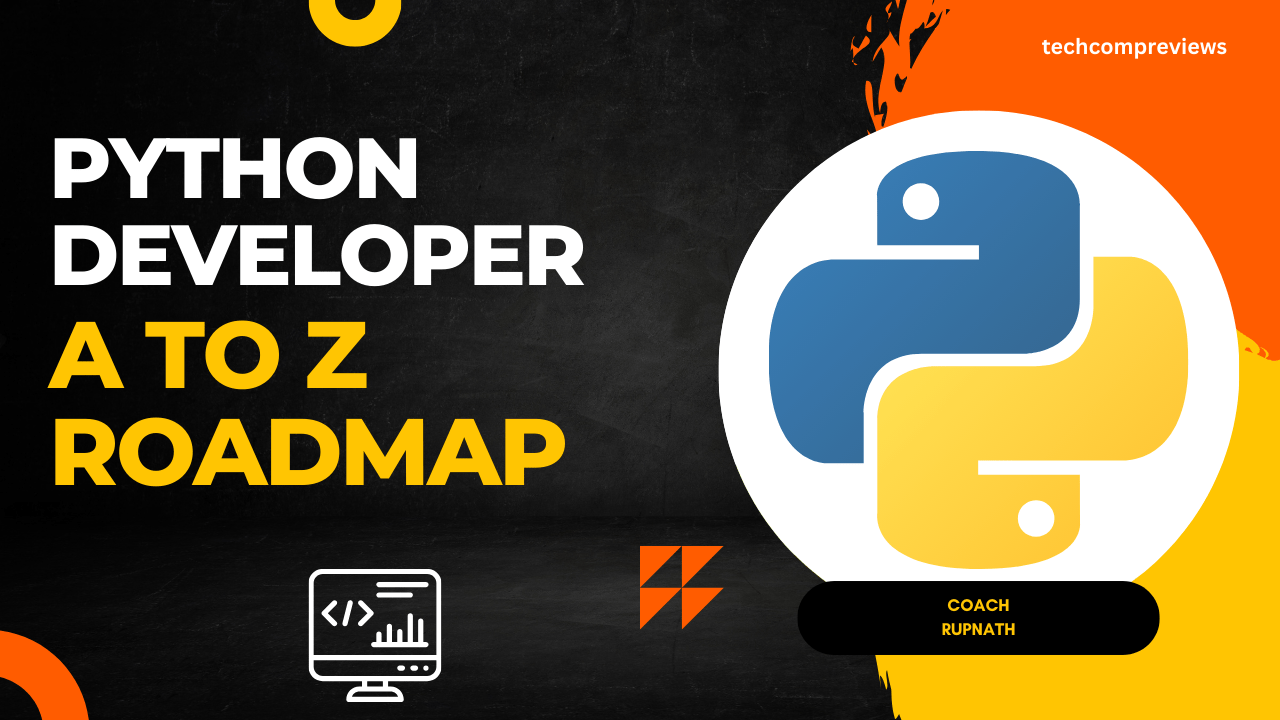So, you’re interested in becoming a Python developer? Awesome choice! I remember being in your shoes, excited to explore into the world of coding and create amazing things. Python’s been my go-to language for years, and it’s truly opened doors to exciting opportunities. I’ve built websites, analyzed data, even dabbled in machine learning—all thanks to this versatile language.
Now, I want to share my journey and guide you on your own path to becoming a Python pro. Let’s discuss the road map I completed, and provides you with valuable skills and resources to guide you on your educational journey.
Python Basics
Every journey begins with a single step, and for us, that step is mastering the fundamentals of Python.
- Introduction to Python: What exactly is Python? Simply put, it’s a high-level, general-purpose programming language known for its readability and beginner-friendliness. Its clear syntax feels almost like plain English, making it a joy to learn and use.
- Installation and setup: Getting started is very easy. Download the latest Python version from the official website and install it on your system. You’ll also want a code editor like Visual Studio Code or PyCharm to write and run your code.
- Python syntax: This is the grammar of the language – how you structure your code. You’ll learn about indentation (very important in Python!), keywords, comments, and more.
- Variables and data types: Think of variables as containers for storing data. You’ll work with various data types like integers, floats, strings, and booleans.
- Operators: These are symbols that perform operations on variables and values, like addition (+), subtraction (-), multiplication (*), and division (/).
- Control flow: This is where you tell your program what to do based on certain conditions using statements like if, elif, and else.
- Loops: Need to repeat a task multiple times? Loops like for and while are your friends.
Gaining understanding of these fundamentals prepares the stage for everything you’ll learn about Python. Take your time at that stage as a strong foundation is required for later growth in more advanced skills.
Data Structures Python
As you start writing more complex programs, you’ll need efficient ways to organize and manage your data. That’s where data structures come in.
- Lists: These are ordered collections of items, perfect for storing sequences of data. You can access, modify, and manipulate list elements easily.
- Tuples: Similar to lists, but immutable – meaning their contents cannot be changed after creation. Great for storing related pieces of information that need to remain constant.
- Dictionaries: These store data as key-value pairs, like a mini-database. You can access values using their corresponding keys, making them ideal for storing and retrieving data efficiently.
- Sets: Unordered collections of unique elements. Useful for tasks like removing duplicates and checking for membership.
- Strings: Represent textual data. You’ll learn various string manipulation techniques to process and analyze text.
- Working with files: Python makes it easy to read from and write to files, allowing you to interact with external data sources.
Understanding how and when to use each data structure is crucial for writing efficient and organized Python code.
Object-Oriented Programming (OOP)
Object-oriented programming (OOP) is a powerful concept that lets you represent real-world items and their relationships as objects in your code. It is a fundamental concept for creating complex and maintainable software.
- Classes and objects: Think of a class as a blueprint for creating objects. Each object is an instance of a class, with its own unique attributes and behaviors.
- Inheritance: Allows you to create new classes (child classes) that attributes properties and methods from existing classes (parent classes). This promotes code reusability and reduces redundancy.
- Polymorphism: The ability of objects from different classes to respond to the same method call in their own way. It provides flexibility and enhances code readability.
- Encapsulation: Using clear interfaces to provide just the information that is required while protecting an object’s behind implementation details. This protects data integrity and promotes modularity.
- Abstraction: Focusing on the essential features of an object without getting bogged down in the specifics of its implementation. This simplifies complex systems and improves code maintainability.
OOP might seem challenging at first, but it’s worth mastering. It’ll change the way you think about programming and help you write cleaner, more organized, and reusable code.
Error Handling
Even the best programmers make mistakes. That’s why learning how to handle errors is crucial for building robust and reliable applications.
- Exception handling: Python uses try and except blocks to handle exceptions – unexpected events that disrupt the normal flow of your program. You can catch specific exceptions and handle them appropriately, preventing your program from crashing.
- Custom exceptions: Additionally, you can create custom exception classes to handle specific error scenarios unique to your application.
Proper error handling your programs can recover from unexpected situations and provide feedback to users.

Libraries and Modules
Python’s large community of prewritten code, such as libraries and modules, which improve the performance of your projects, is one of its strongest points.
- Standard Library: A complete standard library covering a wide range of topics, including file I/O, networking, data processing, and more, is included with Python.
- Third-party libraries: The Python community has developed countless third-party libraries for various tasks. Some popular ones include:
- NumPy: For scientific computing and working with arrays.
- Pandas: For data analysis and manipulation.
- Matplotlib: For creating data visualizations.
- Scikit-learn: For machine learning.
By using libraries and modules, you can save time and effort and focus on the special features of your project.
File Handling
Data often resides outside your program, in files of various formats. Python equips you with tools to interact with this data seamlessly.
- Reading and writing files: You can read data from files into your program and write data from your program into files, allowing you to work with external data sources.
- Working with CSV and JSON data: These are common data formats used for data exchange. Python provides modules like csv and json to easily read and write data in these formats.
File handling skills are essential for many real-world applications, from data analysis to web development.
Advanced Topics
Once you’ve mastered the fundamentals, it’s time to explore some advanced Python concepts that will truly elevate your programming skills.
- Decorators: These are special functions that modify the behavior of other functions without changing their core code. They promote code reusability and enhance functionality.
- Generators: Special functions that generate a sequence of values on demand, instead of storing the entire sequence in memory at once. Great for memory efficiency when dealing with large datasets.
- Context managers: let proper resource allocation and release as required, providing correct cleaning and preventing resource leaks.
- Regular expressions (regex): Effective tools for text manipulation and pattern matching. They provide pattern-based text search, extraction, and manipulation.
These advanced topics might seem intimidating at first, but they’ll significantly enhance your ability to write efficient, elegant, and powerful Python code.
Web Development
Python’s powerful frameworks and ease of use make it a popular choice for web development.
- Introduction to web frameworks: Frameworks like Flask and Django provide a structured foundation for building web applications, handling tasks like routing, templating, and database interaction.
- Building a basic web application: You will gain knowledge on how to build a basic web application that can handle user requests, provide dynamic content, and communicate with databases.
Web development opens up a whole new world of possibilities, allowing you to share your creations with the world.

Databases
Most real-world applications require storing and retrieving data efficiently. That’s where databases come in.
- Introduction to databases: You’ll learn about different database types (relational, NoSQL) and their use cases.
- Using SQLite with Python: SQLite is a lightweight database engine that’s perfect for smaller projects or learning database basics.
- SQLAlchemy (ORM): Database operations may be made simpler by using the powerful Object Relational Mapper (ORM) to communicate with databases using Python objects.
Understanding databases is essential for building data-driven applications and managing information effectively.
Testing and Debugging
Testing and debugging are critical aspects of software development, ensuring your code works as intended and is free of bugs.
- Unit testing: Write unit tests to test individual components of your code in isolation, ensuring each part functions correctly. Libraries like unittest or pytest provide tools for writing and running tests.
- Debugging techniques: Discover how to use debugging tools and methods to find and correct bugs in your code.
Testing and debugging skills are essential for producing high-quality software that you can rely on.
Data Science and Machine Learning (Optional)
Python’s powerful libraries and simplicity of use have made it the most popular language for data science and machine learning.
- Data analysis with Pandas: Use Pandas to load, manipulate, analyze, and visualize data efficiently.
- Data visualization with Matplotlib or Seaborn: Create informative and engaging visualizations to understand patterns and trends in your data.
- Introduction to scikit learn for machine learning: Build predictive models and solve complex problems using machine learning algorithms.
Proficiency in data science and ML is highly valued, providing a gateway to creating professional prospects.
Web Scraping (Optional)
The web is a treasure trove of data. Web scraping allows you to extract this data and use it for various purposes.
- Beautiful Soup and requests library: These libraries provide tools for fetching web pages and extracting data from HTML and XML documents.
- Scraping data from websites: Learn how to extract specific information from websites, like product details, news articles, or social media posts.
Web scraping skills can be valuable for data collection, market research, and building data-driven applications.
Deployment and Hosting
Once you’ve built your amazing Python applications, you’ll want to share them with the world.
- Deploying web applications: Platforms like Heroku and AWS provide easy ways to deploy your web applications and make them accessible to users.
- Hosting Python scripts: You can also host Python scripts on cloud platforms or your own servers to automate tasks or provide API endpoints.
Deployment and hosting skills are crucial for bringing your projects to life and making them accessible to others.

Version Control (Optional)
As your projects grow, keeping track of changes and collaborating with others becomes essential.
- Git and GitHub for code versioning: Git is a popular version control system that lets you effectively communicate with others, keep track of changes made to your code, and roll back to earlier iterations. GitHub and other similar platforms provide a central repository where you may store your code and collaborate with others.
Version control skills are essential for professional software development and effective teamwork.
Real-World Project
The best way to solidify your learning is by applying your knowledge to real-world projects.
- Apply your knowledge: Choose projects that align with your interests and career goals. This could be building a web application, analyzing a dataset, or creating a machine learning model.
- Reinforce your skills: Real projects will challenge you, point out opportunities for growth, and provide you the chance to showcase your skills to hiring managers.
Accept the challenges and enjoy the excitement of learning your code execute.
My Final Thoughts
Remember, this roadmap is just a guide. Your learning path might be unique, and that’s perfectly okay. The key is to keep exploring, experimenting, and most importantly, having fun along the way.
The Python community is large and friendly, and there are a lot of resources available to help you on your learning path. Never be afraid to get in touch with other Python enthusiasts, ask questions, and build connections. All of us are involved in this.
Are you prepared to start your Python journey now? I have believe in you.
